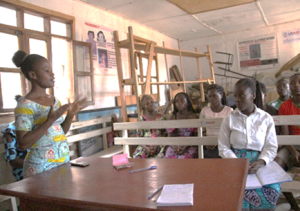International Youth Day | Empowering Young People through Education: Youth Clubs in the Democratic Republic of the Congo
Published on August 9, 2023
By Eta Mbong, Janvier Bulenda, and Bergson Syaivuya, MOMENTUM Integrated Health Resilience, DRC
“Young people are often more comfortable talking about their health needs, especially those related to sexual and reproductive health, with their peers,” said Kavira Esperance, a 24-year-old youth peer educator at the Ngongolio Health Facility in the Democratic Republic of Congo’s (DRC’s) North Kivu province. With collaborative support from MOMENTUM Integrated Health Resilience and the DRC’s Adolescent Health Program, Kavira and other youth educators have been trained to share health information with their peers. This makes it easier for young people to learn about sexual and reproductive health (SRH) topics that can have a lasting impact on their lives.

The idea to set up youth clubs began when MOMENTUM and the Adolescent Health Program conducted a review of literature and data related to SRH in North Kivu during April 2022. This activity brought to light issues including the low use of SRH services by youths and adolescents, high teenage pregnancy rates, and the fact that some young people said they often avoid discussions with their parents on adolescent health issues—especially on SRH, as it is generally considered taboo.
Since then, 18 youth clubs have been established, each with approximately 40 members who range in age from 10 to 24. All the clubs include both girls and boys, though some discussions are organized by age and sex. The meetings are held at least once a month in a public place agreed upon by the members, often at a local health center.
For each meeting, a club president provides opening remarks and the day’s agenda, and a designated peer educator then gives a presentation on a specific adolescent health or SRH topic. Following the presentation, the peer educator opens the floor to a question-and-answer session that lasts about 30 minutes. During this time, club mentors— MOMENTUM staff and local health officials trained by the project and the Adolescent Health Program—help the peer educator field questions.
The youth club meetings cover a variety of topics including personal and menstrual hygiene, teenage and unintended pregnancy, contraception, the impact of early marriage, sexually transmitted infections (STIs), gender-based violence, the consequences of using recreational drugs, and how to use social media in a positive way.
Deborah, a 19-year-old youth club member, was once introverted, but now she regularly participates in group discussions on safe sex and protecting against pregnancy and STIs such as HIV. In fact, Deborah has become her youth club’s secretary and says that the club is not only fun, but also a place to share love and inspiration.
“I was shy before I joined the club,” said Deborah, “but now I have made new friends and learned so much about my health. The club is a safe space where we can talk about anything, and I feel like I can ask questions without being judged.”
According to a World Bank report on the DRC, “In 2017/18, almost one-fourth (23.4 percent) of teenage girls aged 15-19 have already had at least one child or is pregnant, with 2 percent being pregnant even before the age of 15.”1 Early pregnancy can have devastating consequences, causing many teens to drop out of school and expose themselves and their children to various health, emotional, and financial challenges. Thus, the role that youth clubs play aligns with USAID’s Youth in Development policy,2 which envisions a world where “young people have agency, rights, influence, and opportunities to pursue their life goals and contribute to the development of their communities.”
In areas where MOMENTUM has helped set up youth clubs, the number of youths under 20 who use contraception services delivered by health facilities increased from 12 to 17 percent between June 2022 and June 2023. Youth club members also support local health care workers conducting adolescent health and SRH awareness-raising sessions for other young people in their communities. Additionally, the youth clubs have increased access to health education during shocks, such as the prolonged escalation of armed violence in North Kivu, that often force health facilities and schools to close temporarily. In this way, youth clubs help ensure continuity of this critical educational service, which in turn enhances a community’s overall resilience.
As Kavira puts it, “MOMENTUM has given us the knowledge and resources we need to provide better health services to our communities. We are grateful for their support and for the impact they have had on our lives.”
References
- Adelman, M., Trako, I., Faron de Goër, E., & Sallami, M. Empowering Girls and Enhancing Learning in DRC, Note 2 of 3, June 2021. Determinants of the Basic Education Gender Gap in DRC: Supply and Demand Side Factors. https://documents1.worldbank.org/curated/en/733861636744027227/pdf/Determinants-of-the-Basic-Education-Gender-Gap-in-DRC-Supply-and-Demand-Side-Factors.pdf
- USAID. 2022. Youth in Development Policy. https://www.usaid.gov/sites/default/files/2022-12/USAID-Youth-in-Development-Policy-2022-Update-508.pdf

